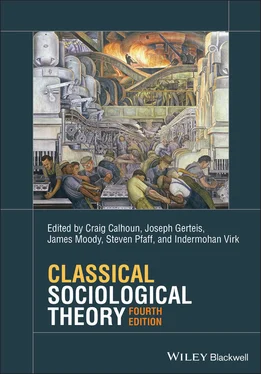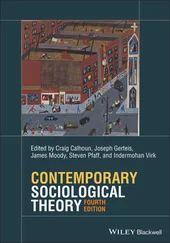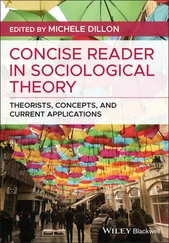Classical Sociological Theory
Здесь есть возможность читать онлайн «Classical Sociological Theory» — ознакомительный отрывок электронной книги совершенно бесплатно, а после прочтения отрывка купить полную версию. В некоторых случаях можно слушать аудио, скачать через торрент в формате fb2 и присутствует краткое содержание. Жанр: unrecognised, на английском языке. Описание произведения, (предисловие) а так же отзывы посетителей доступны на портале библиотеки ЛибКат.
- Название:Classical Sociological Theory
- Автор:
- Жанр:
- Год:неизвестен
- ISBN:нет данных
- Рейтинг книги:3 / 5. Голосов: 1
-
Избранное:Добавить в избранное
- Отзывы:
-
Ваша оценка:
- 60
- 1
- 2
- 3
- 4
- 5
Classical Sociological Theory: краткое содержание, описание и аннотация
Предлагаем к чтению аннотацию, описание, краткое содержание или предисловие (зависит от того, что написал сам автор книги «Classical Sociological Theory»). Если вы не нашли необходимую информацию о книге — напишите в комментариях, мы постараемся отыскать её.
Classical Sociological Theory — читать онлайн ознакомительный отрывок
Ниже представлен текст книги, разбитый по страницам. Система сохранения места последней прочитанной страницы, позволяет с удобством читать онлайн бесплатно книгу «Classical Sociological Theory», без необходимости каждый раз заново искать на чём Вы остановились. Поставьте закладку, и сможете в любой момент перейти на страницу, на которой закончили чтение.
Интервал:
Закладка:
To understand classical social theory requires paying attention to its distinctive historical contexts (and also informs us about them). Harriet Martineau and Alexis de Tocqueville wrote about democracy in America when it was new. Weber wrote about political legitimacy before Germany had become democratic. Karl Mannheim wrote about ideology and utopia in the context of growing struggles between fascism and communism. In fact, all theory needs to be understood in historical context – we need to know the history of our own time – but part of what we mean when we identify certain theories as “contemporary” is that we share the same broad historical situation with their authors. This doesn’t mean that there are no differences among us: today’s historical context feels different in China, the former Soviet Union, Africa and the US.
Which classics seem important shifts as our contemporary interests change. This book is organized around a core set of ideas and issues that helped shape sociology and the understanding of modern society between the 18th Century and the 1960s. There were earlier precursors, and some theory from the 1960s and 70s seems more contemporary than classical. But the 18th, 19th, and 20th centuries were crucial to forming ‘modern society’ and shaping sociology. Our companion volume, Contemporary Sociological Theory , shows how more recent thinkers have grappled with continuing issues from the earlier period and used both classical theory and new theory to engage a new wave of transformations shaping our contemporary world.
Classical sociological theory was overwhelmingly developed in Europe and North America, and mostly by white men of the middle and upper classes. These origins left marks. Like others in their societies, the white men sometimes failed to fully appreciate the contributions of female and Black theorists – and failed to do justice to the importance of gender, sexuality, sexism or heteronormativity, or of race and racism. The Europeans were sometimes blind to the implications of colonization. The Americans were often fascinated by the societies of the continents’ First Peoples, but seldom did much to address their displacement or abuse.
There were classical sociological theorists who recognized and addressed many of these problems. Harriet Martineau analyzed the contradictions of slavery and exclusion of women in her Society in America at about the same time that Alexis de Tocqueville mostly passed over them in his better-known Democracy in America . While some of sociology’s white men rightly praised her account, overall, she like many other women, was relatively neglected by the professors who shaped the discipline’s self-understanding. 6Even more remarkably, Jane Addams was a pioneer in American sociology, teaching in the University of Chicago and publishing in the American Journal of Sociology as the discipline was first institutionalized in the US. She drew on sociology as well as her work with immigrants to help found the field of social work. 7Perhaps most remarkably, the great Black sociologist W.E.B. Du Bois was not just neglected but actively excluded from sociology. 8His work should have shaped ‘mainstream’ sociology more than it did. This has left ‘unfinished business’ on race above all, but also on cities and colonialism. Innovation in contemporary sociological theory is based partly on recovering neglected voices or themes or arguments from classical sociological theory.
It is not accidental that Martineau and Addams were women, and Du Bois was Black. Correction of biases and blind spots has been driven by inclusion of women and people of color (and indeed, sociology has been among the most inclusive of all academic disciplines). Likewise, sociological theory has been improved by perspectives rooted in the postcolonies of the global South, in the communist and then formerly communist countries, and writing from non-Western civilizational histories.
New research is still shaped by the questions classical theorists asked and their strategies for answering them are still helpful. Du Bois, offers a powerful example. He worked to integrate analysis of racial domination into a perspective also shaped by his fellow classical theorists Max Weber and Karl Marx. He argued, for example, that we should not think in terms of race vs class but of their deep relationship, that experiencing racial domination and nationality produced ‘double-consciousness’, and that basic social trends like urbanization could not be understood apart from the racial and ethnic organization of cities. He helped to create a perspective later sociologists called ‘intersectionality’ – thinking in terms of ‘both/and’ rather than ‘either/or’. 9
As the work of Du Bois demonstrates, improvement in sociological theory is not just a matter of representation or inclusion. It is innovation, which is constant not only because of faults discovered in older work, but also because society changes, research produces new or more precise empirical evidence, and because theorists develop powerful new ideas. Du Bois’ work is relevant to sociological theory in general, not just theories of race. Likewise, Martineau’s and Addams’ work is relevant beyond questions of gender.
Continuing the work of theoretical innovation is important today. This is why there is a companion volume on ‘contemporary’ theory. New theory is not only guided by classical theory, but strengthened by engaging it, becoming part of the enduring intellectual project it initiated.
From Social Thought to Sociological Theory
Sociological theory is a relatively new project, developed as part of modern science. But it is closely connected to a long history of social thought, extending back to the ancient world and part of every civilization. In the West, Greek philosophers, Roman lawyers, and Jewish and Christian religious scholars all contributed significantly to the “prehistory” of sociological theory. They thought about what made society, how it changed, what rulers – or parents – should and shouldn’t do, and what caused social order sometimes to collapse. The Jewish Torah and Talmud include social thought expressed in rules, narratives, and analytic reflections. The Christian Bible engages in social thought with accounts of marriage and family, communities based on love, and ‘rendering unto Caesar that which is Caesar’s”.
Social thought is also prominent in the Koran and flourished in the Muslim empires that reached from what are now Spain, Syria and Persia through Northern Africa, Mughal India, and along the coasts of Asia. Likewise, social thought was highly developed in the China’s Confucian tradition – which emphasized harmonious integration – and in its ‘Legalist’ adversary – which emphasized strategic use of power. Social thought is important to Buddhist traditions that spread from India across Asia and to Hinduism’s Vedic narratives. Most of what we know about all this earlier social thought comes from surviving texts. But social thought was also embedded in thinking about kinship, clans, ancestors, and how to resolve disputes among peoples with little or no writing, whether in Africa, the Americas, or Europe.
In short, thinking about social relations, change, culture, or power is not unique to the modern Western experience that generated sociology. All the world’s civilizations can – and do – contribute to sociology and to sociological theory. Indeed, there are important criticisms of Western sociological and significant alternative versions from postcolonial and other non-Western thinkers. Within every tradition there are efforts to think beyond the contexts of its origins.
But for all the diverse anticipations of sociological theory, and all its continued transformations, it was formed crucially between the 18th and mid-20th centuries as European and North American societies grappled with the challenges of the era they called modernity. The scientific revolution made it possible. But the project of specifically sociological theory seemed needed because of rapid and unsettling change in social organization, social psychology, culture, and the relation of politics and economics to each of these. We look first at how science shaped the distinction of sociological theory from social thought in general, and in the next section at the issues that became its enduring central themes.
Читать дальшеИнтервал:
Закладка:
Похожие книги на «Classical Sociological Theory»
Представляем Вашему вниманию похожие книги на «Classical Sociological Theory» списком для выбора. Мы отобрали схожую по названию и смыслу литературу в надежде предоставить читателям больше вариантов отыскать новые, интересные, ещё непрочитанные произведения.
Обсуждение, отзывы о книге «Classical Sociological Theory» и просто собственные мнения читателей. Оставьте ваши комментарии, напишите, что Вы думаете о произведении, его смысле или главных героях. Укажите что конкретно понравилось, а что нет, и почему Вы так считаете.












